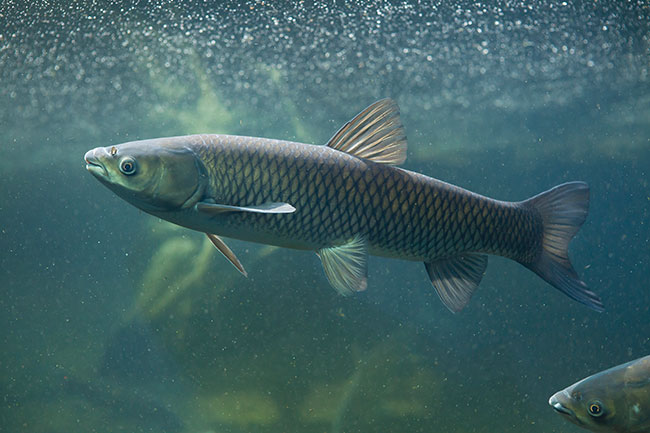
News & Views
Fish Nutrition
Seaweed for juvenile grass carp shows potential for Gran Canaria’s blue economy
February 10, 2023 By Ruby Gonzalez
 photo: © Vladimir Wrangel / Adobe Stock
photo: © Vladimir Wrangel / Adobe Stock Macroalgal wracks have potential as a feed additive in juvenile grass carp (Ctenopharyngodon idella) diets, creating an economic value to the marine plants.
A study in Spain by Galindo et al. cited that seven per cent of the macroalgae may be included in the diet “without detrimental effect on C. idella survival, growth, proximate composition, FA (fatty acids) or LC (lipid classes) profile, oxidative status, and digestive capacity.”
Inclusion of either a mixture of seaweed wracks species or a Lobophora sp. wrack produced similar growth performance than the commercial control diet.
A freshwater species, grass carp has been the major fish species produced in the world in the last years.
As a feed ingredient, algae have been identified as alternative sources of lipids and proteins.
The experiment focused on using relatively small doses of the ingredient to make diet inclusion more economically viable. “In our study, a dietary seven per cent inclusion of either a mixture of seaweed wracks species or a Lobophora sp. wrack produced similar growth performance than the commercial control diet. The utilization of seaweeds as an ingredient per se, at an industrial scale, requires expensive processes that makes it often not economically viable.
“Thereby, in the last years, the interest for macroalgae has emphasized on a quality more than on a quantity approach, based on their content in bioactive compounds. Hence, the inclusion of macroalgae in aquafeeds is now more focused on low inclusion levels, than on their use as main ingredients,” the authors explained.
Seaweed wracks are clamps that are break free from seabed and washed over the beach, creating an eyesore. These are usually collected and brought to the landfills. Left untouched on the shore, the biomass decomposes and eventually produce an unpleasant smell.
“The utilization of macroalgal biomass that is usually discarded in aquafeeds might contribute to the sustainable use of ocean resources empowering the blue economy strategy in islands, also reducing aquaculture reliance on fish oil and fish meal,” they said.
The study, published on Aquaculture Nutrition, was conducted over 100 days on juvenile grass carp in RAS facilities in Gran Canaria, Spain.
Print this page





